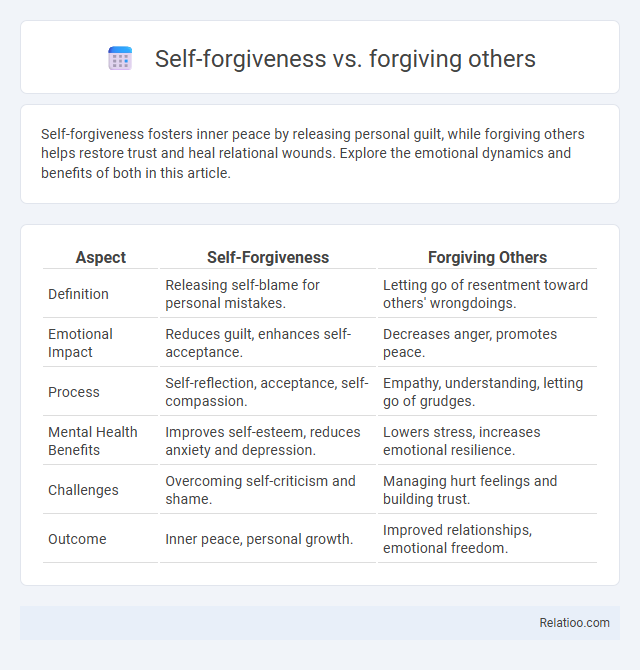Self-forgiveness fosters inner peace by releasing personal guilt, while forgiving others helps restore trust and heal relational wounds. Explore the emotional dynamics and benefits of both in this article.
Table of Comparison
| Aspect | Self-Forgiveness | Forgiving Others |
|---|---|---|
| Definition | Releasing self-blame for personal mistakes. | Letting go of resentment toward others' wrongdoings. |
| Emotional Impact | Reduces guilt, enhances self-acceptance. | Decreases anger, promotes peace. |
| Process | Self-reflection, acceptance, self-compassion. | Empathy, understanding, letting go of grudges. |
| Mental Health Benefits | Improves self-esteem, reduces anxiety and depression. | Lowers stress, increases emotional resilience. |
| Challenges | Overcoming self-criticism and shame. | Managing hurt feelings and building trust. |
| Outcome | Inner peace, personal growth. | Improved relationships, emotional freedom. |
Understanding Self-Forgiveness
Understanding self-forgiveness involves recognizing your own imperfections and releasing guilt to foster emotional healing and personal growth. While forgiving others helps mend relationships and promotes empathy, self-forgiveness directly impacts your mental well-being by reducing self-criticism and enhancing self-compassion. Your ability to practice self-forgiveness is crucial for overcoming past mistakes and building resilience in the face of challenges.
The Essence of Forgiving Others
The essence of forgiving others lies in releasing resentment and fostering empathy, which promotes emotional healing and mental well-being. Forgiving others involves recognizing their humanity and imperfections, enabling personal growth and healthier relationships. While self-forgiveness focuses on overcoming guilt and self-blame, forgiving others centers on empathy and compassion to restore peace and reduce interpersonal conflict.
Key Differences: Self-Forgiveness vs Forgiving Others
Self-forgiveness involves acknowledging personal mistakes, accepting responsibility, and releasing self-directed guilt to restore inner peace, while forgiving others focuses on letting go of resentment and anger toward external individuals for their wrongdoings. The key difference lies in the recipient of forgiveness: self-forgiveness is an internal process promoting self-compassion and emotional healing, whereas forgiving others addresses interpersonal conflicts and fosters reconciliation. Effective self-forgiveness requires introspection and self-acceptance, whereas forgiving others demands empathy and understanding of the offender's perspective.
Psychological Benefits of Self-Forgiveness
Self-forgiveness promotes emotional healing by reducing guilt and shame, which are often barriers to mental well-being. Psychological benefits include enhanced self-esteem, decreased anxiety, and greater resilience in coping with personal mistakes. Unlike forgiving others, self-forgiveness directly rebuilds the internal self-relationship, fostering long-term emotional stability.
Emotional Impact of Forgiving Others
Forgiving others releases emotional burdens such as anger, resentment, and bitterness, which can lead to improved mental health and reduced stress. You experience emotional relief and enhanced well-being by letting go of grudges, fostering empathy and compassion in your relationships. While self-forgiveness heals internal guilt and shame, forgiving others primarily transforms interpersonal conflicts into opportunities for emotional growth and resilience.
Common Barriers to Forgiveness
Common barriers to forgiveness include fear of vulnerability, holding onto resentment, and unrealistic expectations of apology or justice. Self-forgiveness often struggles against internalized guilt and shame, while forgiving others may be hindered by anger and perceived betrayal. Understanding these psychological obstacles can help you navigate the complex path toward emotional healing and relational peace.
Steps Towards Genuine Self-Forgiveness
Steps towards genuine self-forgiveness involve acknowledging your mistakes honestly and accepting responsibility without excessive self-criticism. Practicing self-compassion and reframing negative thoughts helps repair your internal dialogue, fostering emotional healing. Distinguishing self-forgiveness from forgiving others is essential, as self-forgiveness centers on restoring your own peace, while forgiving others addresses external conflicts.
Practical Strategies for Forgiving Others
Effective practical strategies for forgiving others include active listening, expressing empathy, and setting clear boundaries to rebuild trust while maintaining emotional well-being. Techniques such as journaling feelings, practicing mindfulness, and engaging in open dialogue facilitate emotional release and promote healing. Research in psychology highlights that forgiveness reduces stress, lowers aggression, and improves interpersonal relationships, making it a critical component of emotional resilience.
The Role of Empathy in Both Processes
Empathy plays a crucial role in both self-forgiveness and forgiving others by allowing you to understand and acknowledge emotions, whether they stem from your own mistakes or the actions of others. In self-forgiveness, empathy fosters compassion towards yourself, reducing guilt and promoting emotional healing. When forgiving others, empathy helps you see situations from their perspective, facilitating reconciliation and emotional release.
Cultivating a Forgiving Mindset for Personal Growth
Cultivating a forgiving mindset for personal growth involves balancing self-forgiveness, forgiving others, and self-compassion to release resentment and promote emotional healing. Research shows that self-forgiveness reduces negative self-judgment and fosters resilience, while forgiving others enhances social connections and lowers stress-related health risks. Integrating these practices supports psychological well-being by encouraging empathy, reducing anger, and reinforcing positive self-identity.

Infographic: Self-forgiveness vs Forgiving others
 relatioo.com
relatioo.com